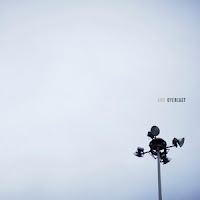 A recent Metafilter article brought up the subject of Marcel Duchamp's "readymades". The Readymades were everyday objects that Duchamp called art. The two best-known are a bicycle wheel stuck to the top of a stool and, most famously, a urinal signed "R. Mutt".
A recent Metafilter article brought up the subject of Marcel Duchamp's "readymades". The Readymades were everyday objects that Duchamp called art. The two best-known are a bicycle wheel stuck to the top of a stool and, most famously, a urinal signed "R. Mutt".Some people argue that in fact these were not items off-the-shelf, but pieces specifically created by Duchamp to look like off-the-shelf items.
This coincided with the release of a remastered version of "In The Long Grass", by The Boomtown Rats. Until this event, this was one of the few albums in my vinyl LP collection which was not available on CD (or in any digital form).
I was at the gym, starting my workout as the album came on. I couldn't wait to hear it in nice, clean, crisp sound. I was surprised to find the album order had been changed from my USA release. And even more surprised to find 3 of the album's 10 tracks ("Drag Me Down", "Dave", "Lucky") to be totally different recordings.
There was a moment of wondering if I had fallen into a parallel universe. I wasn't sure what was going on. Maybe I was so used to hearing the degraded vinyl version that the new fidelity was confusing me.
But no, I'm a musician, I have good ears. These were different mixes with different vocals. And I didn't think I liked them!
I got home and asked my friend The Internet, and he told me the truth - these were in fact the original mixes. Bob Geldof and The Boomtown Rats had to do the new mixes and recordings for the US release. And Bob & co. felt the new versions were markedly inferior to the original versions. So for the album, they'd decided to put the originals back on, restore the correct running order, and release the "correct" version of the album.
Well, this really bothered me. I actually had first heard the other, "bad" versions
 . And I liked them. In fact, I liked them better than the "correct" versions. But I also really liked the album and really liked the band. I could have gone to my grave not hearing the new version of the record and never thought anything was amiss.
. And I liked them. In fact, I liked them better than the "correct" versions. But I also really liked the album and really liked the band. I could have gone to my grave not hearing the new version of the record and never thought anything was amiss.I think about Marcel Duchamp.
Then, out of the blue, Thomas Dolby reissues a nice, deluxe, definitive version of his debut album, "The Golden Age of Wireless".
I originally owned this album on cassette. I listened to it extensively in the early 80s. At TIP one year, I met a girl who also had a copy. We were listening to hers and the second track ("Radio Silence") came on. Her cassette had a very different version of the song than mine did. Hers had guitars and live drums. Mine was synthesizers and sequencers. Weird.
Over the next few years, I found out that "Wireless" had not only been released in these 2 different versions, with different mixes of "Radio Silence", but had originally been issued without its biggest hit ("She Blinded Me With Science") and its best track ("One Of Our Submarines"), and had included Thomas Dolby's first 2 songs "Leipzig" and "Urges".

On top of that, there were some versions that used the "short" version of "She Blinded Me With Science" and some that used the more famous 12" mix (famous for its stuttering "Sci-i-i-ence" edits, one of the sounds that defined 80s dance music).
There were different versions of the album cover. There may have even been different versions of "Airwaves" - some with the bridge, some without.
Which one of these was the "right" album? The definitive album?
There are other instances of this sort of confusion around the "original" work, whether it is George Lucas "improving" the early Star Wars movies or Star Trek's original series getting "digitally remastered" (i.e. completely re-done) special effects.

Todd Rundgren once said that after he'd heard a mix 3 times it became the final, definitive mix for him. He's concisely describing what I'm getting at here: The first experience one has with a particular work is usually the defining experience. Regardless of what tweaks the artist may insist are needed (or not), the viewer seldom notices the differences - unless the works are put up against each other in a "spot the differences"-type of comparison.
The original experience is the one that contains all the power. Any later modifications cannot substantially affect this original experience. It is said "You only get one chance to make a first impression" - that's especially true in art.
I think this also means there's little value in revisiting previous works with an eye towards "improving" them. While I find it interesting to hear the Boomtown Rats' other takes on their material, it doesn't change my feelings about the album as a whole, or the missing tracks, or the new/replacement tracks. The best thing about the Thomas Dolby remaster isn't the changing of the running order to what is "correct", or the deletion or replacement of "Science", "Submarines", "Leipzig", and "Urges". It's the addition of long-lost singles and b-sides, some of which I've never heard before.
Whether Duchamp created the readymades from scratch or not is irrelevant at this point - everyone experienced the idea of the readymades with the (possibly incorrect) understanding they were common household objects. That idea gave them power, even if it's not true, or wrong, and even if the artist could take it back or change it later.
The initial impact of the idea matters most. Aim carefully. You only get one shot.

















